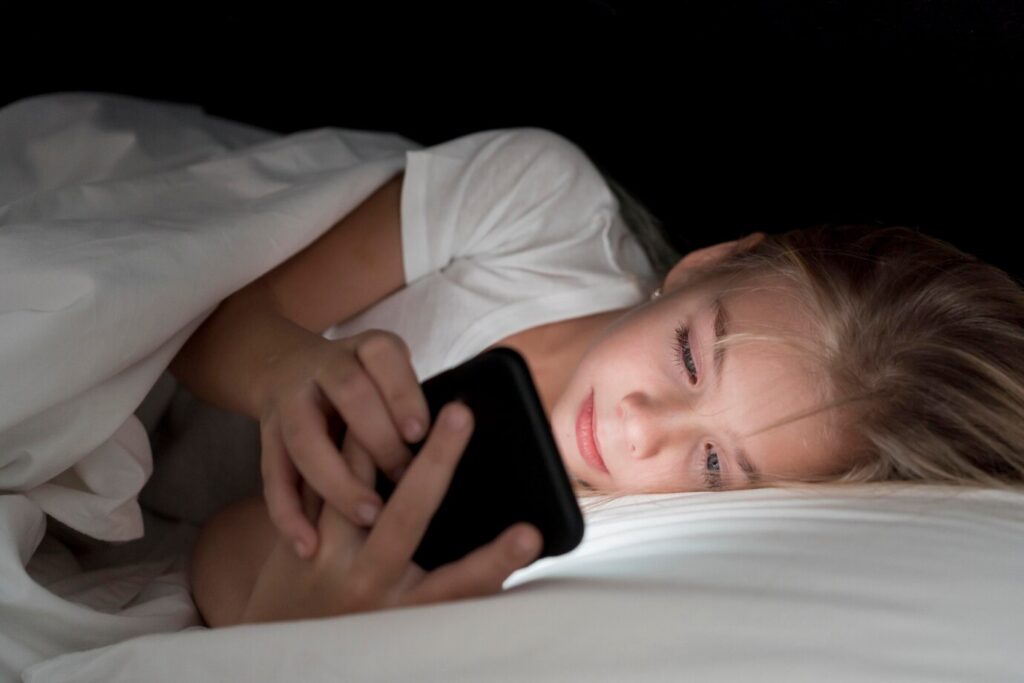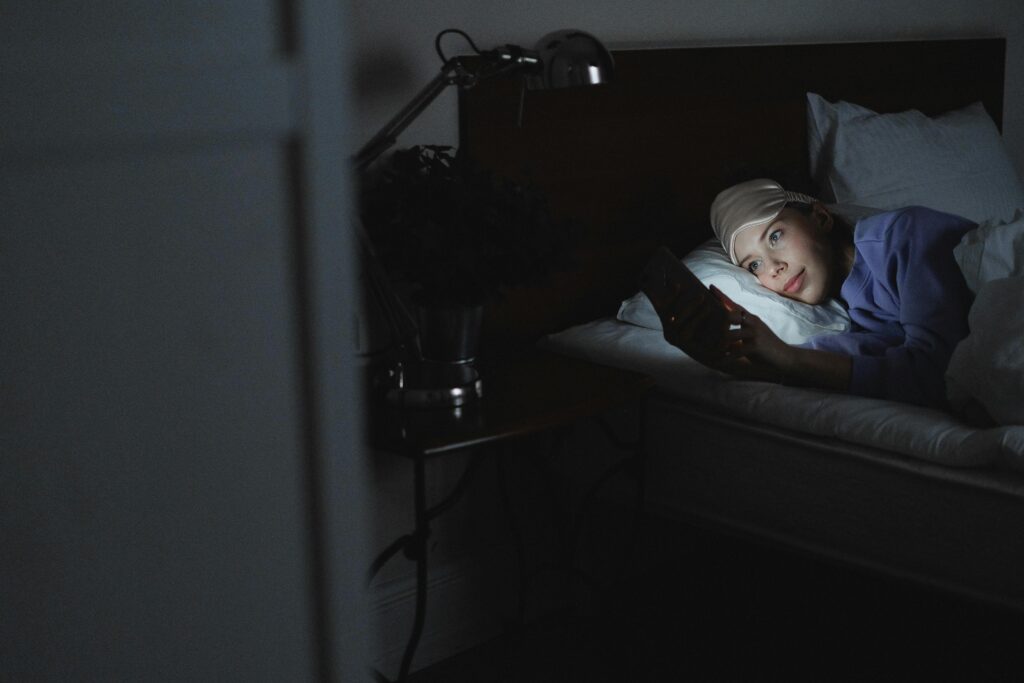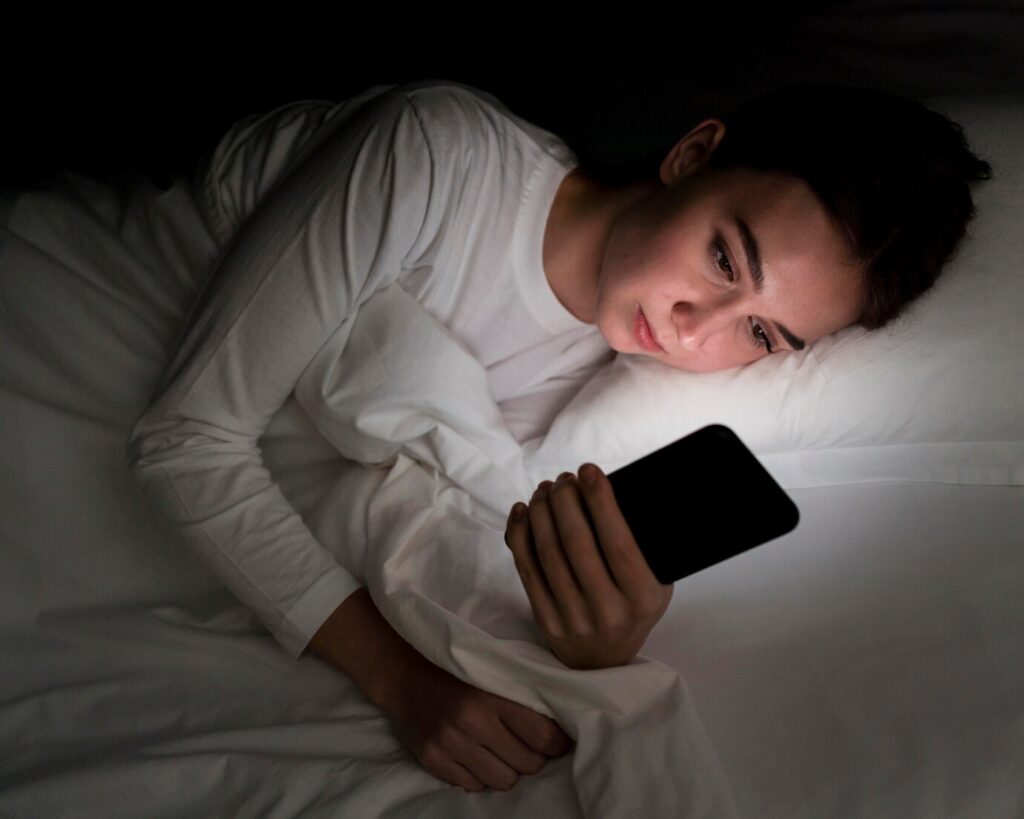Whether scrolling through social media, watching videos, or answering emails, using your phone at night can have serious consequences for your sleep quality. The blue light emitted by phone screens interferes with melatonin production, the hormone responsible for regulating sleep. In this blog, we will discuss the best time to stop using your phone before bed and provide practical tips to improve sleep quality.
How Does Screen Time Affect Sleep?
The increasing reliance on electronic devices has made screen time a major concern for sleep health. Studies show that exposure to blue light from screens can delay the release of melatonin, making it harder to fall asleep and stay asleep.
1. Disrupts Melatonin Production
One of the biggest issues with nighttime screen time is its impact on melatonin production. Melatonin is a hormone produced by the pineal gland in response to darkness, signaling the body that it’s time to sleep. However, exposure to blue light from phone screens tricks the brain into thinking it’s still daytime, suppressing melatonin production and delaying sleep onset.
2. Increases Alertness and Delays Sleep
Using a phone before bed keeps the brain engaged, making it difficult to unwind. Whether you’re checking notifications or watching stimulating content, this increases mental alertness and pushes back your natural sleep cycle.
3. Reduces REM Sleep
REM sleep is essential for memory consolidation and cognitive function. Excessive screen time before bed can reduce REM sleep, leading to grogginess and reduced mental clarity the next day.
Read the Latest: Why Blue Light Disrupts Sleep and How to Avoid It?
When Should You Stop Using Your Phone Before Bed?
To maintain a healthy sleep schedule, it’s recommended to stop using your phone at least 30 to 60 minutes before bedtime. However, for those struggling with sleep issues, stopping 2 hours before bed may be even more beneficial.
Ideal Time to Stop Using Your Phone Before Bed
Using your phone late at night can disrupt melatonin production and negatively impact sleep quality. To counteract this, experts recommend setting a strict screen time cutoff before bedtime. However, the ideal duration depends on individual sleep patterns and health conditions. Below are the best recommendations based on sleep research.
1. Minimum Recommendation: 30–60 Minutes Before Bed
For those who struggle with occasional sleep issues but generally maintain a good sleep routine, stopping screen time at least 30 to 60 minutes before bed can be beneficial.
Why It Helps:
- Reduces blue light exposure, allowing melatonin production to begin naturally.
- Gives the brain time to relax and unwind before sleep.
- Lowers mental stimulation from social media, emails, and notifications.
Who Should Follow This?
- People who fall asleep easily but wake up feeling groggy.
- Those who occasionally experience mild insomnia.
- Individuals looking to improve sleep quality without making drastic lifestyle changes.
Tip: If reducing screen time seems challenging, start by switching to “night mode” on your phone and gradually increasing the time you avoid screens before bed.
2. Optimal Recommendation: 90 Minutes Before Bed
For those aiming to improve overall sleep quality, cognitive function, and energy levels, stopping phone use 90 minutes before bed is considered the optimal choice.
Why It’s More Effective:
- Allows melatonin levels to rise significantly, helping the body transition into sleep mode.
- Reduces mental overstimulation, which can delay sleep onset.
- Helps lower cortisol (stress hormone), making it easier to relax.
- Supports circadian rhythm by signaling to the brain that it’s time to rest.
Who Should Follow This?
- People who experience frequent sleep disturbances.
- Those who wake up multiple times during the night.
- Anyone looking to improve deep sleep for better energy and mood.
Tip: Replace screen time with calming activities such as reading a physical book, stretching, or practicing meditation.
3. Best Practice for Sleep Disorders: 2 Hours Before Bed
For individuals dealing with chronic insomnia, sleep apnea, or other sleep disorders, the best practice is to avoid screen time for at least 2 hours before bed.
Why It’s the Best Choice:
- Eliminates nearly all blue light exposure, ensuring natural melatonin production.
- Helps reset the body’s internal clock, improving long-term sleep patterns.
- Prevents overstimulation from late-night social media use, texting, or TV.
- Allows the brain to enter a state of relaxation, making it easier to fall asleep naturally.
Who Should Follow This?
- People who have chronic insomnia or difficulty falling asleep for several nights in a row.
- Those who feel restless or alert even after getting into bed.
- Individuals experience severe daytime fatigue due to poor sleep.
- Anyone struggling with mental health issues related to sleep deprivation.
Tip: If avoiding screens two hours before bed seems unrealistic, use blue-light-blocking glasses and keep the bedroom free from electronic distractions.
Read the Latest Blog On: Why Sleep Deprivation Recovery Programs Are on the Rise!

How to Successfully Reduce Nighttime Screen Time
If you’re used to scrolling through your phone before bed, quitting abruptly can be challenging. Instead, try these gradual steps to ease into healthier nighttime habits:
1. Set an Alarm as a “Screen Time Cutoff”
- Just as you set an alarm to wake up, set one to remind you to put your phone away.
- Choose a time based on your ideal screen-free duration (30 minutes, 90 minutes, or 2 hours).
- When the alarm rings, place your phone in a different room or turn on “Do Not Disturb” mode.
2. Create a Relaxing Bedtime Routine
Replace screen time with calming activities such as:
- Reading a physical book or listening to an audiobook.
- Practicing deep breathing or meditation.
- Taking a warm bath or drinking herbal tea.
- Writing in a journal to clear your mind.
3. Charge Your Phone Outside the Bedroom
- Keeping your phone in another room prevents mindless scrolling at night.
- Use a traditional alarm clock instead of your phone to wake up.
- If you must keep your phone in the bedroom, place it on airplane mode to eliminate notifications.
4. Use Night Mode & Blue Light Filters
If you absolutely need to use your phone at night, reduce the impact by:
- Activating “Night Shift” or “Dark Mode” on your device.
- Using blue light-blocking glasses to minimize eye strain.
- Lowering screen brightness to reduce glare.
5. Replace Phone Time with Gentle Movement
- Try light stretching or yoga to release tension.
- Take a short walk in dim lighting to signal your body that it’s time to wind down.
- Engage in progressive muscle relaxation to prepare your body for sleep.
Practical Tips to Reduce Screen Time Before Bed
1. Use Night Mode or Blue Light Filters
Most smartphones come with a night mode or blue light filter that reduces blue light exposure. While this helps to some extent, it does not completely eliminate the negative effects on melatonin production.
2. Set a Digital Curfew
Establish a strict screen time cutoff before bed. Set an alarm or use apps that limit your phone usage during nighttime hours.
3. Replace Phone Use with Relaxing Activities
Instead of scrolling through your phone, engage in activities that promote relaxation, such as:
- Reading a book (preferably a physical book or e-reader without blue light)
- Practicing meditation or deep breathing exercises
- Journaling your thoughts and reflections
- Listening to soothing music or a podcast
4. Keep Your Phone Away from the Bed
Avoid the temptation of checking your phone by placing it in another room or turning it off before bed. Using a traditional alarm clock instead of a phone alarm can also help reduce nighttime screen time.
5. Try Blue Light Blocking Glasses
If you must use a screen at night, wearing blue light-blocking glasses can help minimize the negative effects on melatonin production.
Effects of Poor Sleep Due to Screen Time
Excessive screen time before bed has a serious impact on overall health and well-being. When the body’s natural sleep cycle is disrupted, it can trigger a chain reaction of negative effects. Below are some of the most common health problems linked to poor sleep caused by late-night phone use.
1. Chronic Insomnia
One of the most immediate effects of nighttime screen time is chronic insomnia, difficulty falling asleep, staying asleep, or waking up too early and being unable to fall back asleep. Since blue light suppresses melatonin production, the body struggles to transition into a restful sleep state. Over time, this leads to:
- Increased sleep latency (longer time to fall asleep)
- Frequent nighttime awakenings
- Feeling unrested even after a full night’s sleep
If left unaddressed, chronic insomnia can become a long-term condition that significantly impacts daily functioning.
2. Daytime Fatigue
Poor sleep directly contributes to daytime fatigue, making it difficult to stay focused and productive throughout the day. Common symptoms include:
- Excessive sleepiness during work or school
- Slower reaction times
- Decreased ability to concentrate and retain information
This fatigue doesn’t just impact performance at work or school, it also increases the risk of accidents while driving or operating machinery.
3. Weakened Immune System
Sleep plays a vital role in strengthening the immune system. When screen time disrupts sleep, the body doesn’t have enough time to repair and regenerate cells, leading to a weaker immune response. This makes individuals more susceptible to infections, colds, and flu. Over time, chronic sleep deprivation can contribute to more serious conditions such as:
- Increased inflammation in the body
- Slower wound healing
- Higher susceptibility to chronic diseases like diabetes and heart disease
4. Weight Gain and Metabolic Disorders
Poor sleep affects the body’s ability to regulate hunger hormones such as ghrelin (which increases appetite) and leptin (which signals fullness). Sleep deprivation leads to:
- Increased cravings for high-calorie, sugary, and processed foods
- Higher likelihood of late-night snacking
- Reduced metabolism, making it harder to burn calories
Long-term screen time-induced sleep loss can also contribute to conditions like obesity, type 2 diabetes, and metabolic syndrome.
5. Mental Health Issues
Sleep is directly linked to mental health, and excessive screen time before bed increases the risk of mood disorders such as:
- Anxiety: Lack of sleep heightens stress responses, making individuals more prone to anxiety and irritability.
- Depression: Poor sleep reduces serotonin levels, a neurotransmitter that regulates mood and emotions.
- Emotional Instability: Sleep deprivation makes it harder to control emotions, leading to mood swings and increased frustration.
6. Increased Risk of Heart Disease
Long-term sleep deprivation has been linked to an increased risk of cardiovascular diseases, including:
- High blood pressure
- Increased heart rate
- Higher cholesterol levels
Since screen time interferes with melatonin production, it indirectly affects blood pressure regulation, increasing strain on the heart over time.
7. Reduced Cognitive Function
Using a phone late at night negatively impacts brain function, leading to:
- Memory problems—Difficulty retaining and recalling information
- Decreased creativity—Poor sleep reduces the brain’s ability to make new connections
- Slower decision-making—Fatigue impairs judgment and problem-solving abilities
These cognitive impairments can impact daily tasks, work performance, and even relationships.

8. Poor Skin Health
Lack of sleep caused by screen time can also take a toll on skin health. Sleep is the body’s natural repair process, and when it is disrupted, it leads to:
- Increased acne and breakouts—Higher levels of stress hormones like cortisol
- Dull complexion—Reduced blood flow to the skin during sleep deprivation
- Premature aging—Less collagen production, leading to wrinkles and fine lines
For those who want to maintain healthy, youthful skin, limiting blue light exposure at night is essential.
9. Hormonal Imbalance
Melatonin isn’t the only hormone affected by late-night screen time. Sleep deprivation disrupts the balance of multiple hormones, including:
- Cortisol (stress hormone): Higher levels lead to increased stress and anxiety.
- Growth hormone: Essential for muscle repair and development; lack of sleep reduces its production.
- Insulin: Poor sleep affects insulin sensitivity, increasing the risk of diabetes.
Over time, these imbalances can lead to serious health complications.
10. Increased Risk of Longevity-Related Diseases
Several studies have linked long-term sleep deprivation to increased risks of chronic diseases, including:
- Alzheimer’s disease—Lack of sleep contributes to the buildup of toxic proteins in the brain.
- Stroke—Irregular sleep patterns increase the likelihood of blood clot formation.
- Cancer—Disrupted sleep cycles may affect the body’s ability to fight off abnormal cell growth.
Read the Latest Blog On: How Sleep Tourism Became 2025’s Leading Wellness Trend
How to Reverse the Effects of Poor Sleep Due to Screen Time
If you’ve been struggling with poor sleep due to excessive screen time, here are a few steps to get your sleep cycle back on track:
1. Create a Sleep-Friendly Environment
- Keep the bedroom dark and cool.
- Use blackout curtains to reduce artificial light exposure.
- Avoid using electronic devices at least 60–90 minutes before bed.
2. Follow a Consistent Sleep Schedule
- Go to bed and wake up at the same time every day, even on weekends.
- Set a wind-down routine that includes reading or meditation instead of phone use.
3. Practice Digital Detox Before Bed
- Turn off notifications to prevent distractions.
- Charge your phone outside the bedroom.
- Use blue light-blocking glasses if you must use screens at night.
4. Get Natural Light Exposure During the Day
- Spend at least 20–30 minutes in natural sunlight in the morning.
- This helps regulate melatonin production and improves sleep quality at night.
5. Try Relaxation Techniques
- Practice deep breathing or meditation.
- Drink herbal tea (such as chamomile or lavender) before bed.
By making small changes in screen time habits, you can significantly improve your sleep quality and overall health.
Should You Use Sleep Apps on Your Phone?
Some people use sleep-tracking apps or meditation apps to improve their sleep quality. While these can be helpful, they should be used before your designated screen time cutoff. To maximize benefits, try using an audio-based sleep app that does not require looking at the screen.
Case Studies | Real Stories on Reducing Phone Use Before Bed
The Active Health Sport Team has received numerous testimonials from individuals who struggled with poor sleep due to nighttime screen use. Here are three compelling stories of people who took control of their bedtime phone habits and saw a dramatic improvement in their sleep quality and overall well-being.
Case Study 1: Valeriaa Mareo – From Midnight Scrolling to Deep Sleep
Valeriaa, a 34-year-old marketing manager, had always struggled with sleep. After long workdays, she found herself scrolling through social media for hours before bed. What started as a way to unwind quickly turned into a habit of staying up until 1 or 2 AM, leaving her exhausted the next day.
After reading about the impact of blue light on melatonin production, Valeriaa decided to set a strict no-phone rule 45 minutes before bedtime. She replaced scrolling with reading a book and listening to calming music. Within a few weeks, she noticed a drastic improvement in her ability to fall asleep faster and wake up feeling refreshed. She also experienced fewer headaches and less brain fog at work.
“I didn’t realize how much my phone was affecting my sleep until I cut it out before bed. Now, I wake up feeling well-rested and more productive. It’s been life-changing.”
Case Study 2: Nicholas Mourn – Beating Insomnia by Breaking the Screen Habit
Nicholas, a 42-year-old software engineer, had been dealing with chronic insomnia for years. He often stayed up late watching YouTube videos, convincing himself that it helped him relax. However, he would find himself tossing and turning in bed long after turning off his phone.
After speaking with a sleep specialist, Nicholas learned that excessive nighttime screen use was keeping his brain overstimulated. He decided to make a major change: turning off all screens at least an hour before bed. Instead of watching videos, he started journaling and practicing mindfulness. Within a month, his sleep dramatically improved. He no longer woke up in the middle of the night, and his energy levels during the day soared.
“I was skeptical at first, but cutting out screen time before bed made a huge difference. My mind feels calmer at night, and I actually sleep through the night now.”
Case Study 3: Loralee Aley – A Family’s Digital Detox for Better Sleep
Loralee, a 39-year-old mother of two, realized that her entire family was struggling with sleep. Her teenage kids would stay up late on their phones, and she and her husband would often fall asleep with the TV on. Everyone woke up groggy and irritable, relying on caffeine to get through the day.
Determined to make a change, Loralee implemented a “no screens after 9 PM” rule in their household. She created a charging station in the living room where everyone placed their devices before bed. The family started engaging in more meaningful evening activities, reading, playing board games, and having bedtime conversations.
The results were incredible. Within weeks, everyone in the family noticed improved sleep and better moods. Loralee also felt more connected to her kids, and the mornings became less stressful.
“We didn’t realize how much screen time was disrupting our sleep until we made the change. Now, bedtime feels peaceful, and we all wake up feeling better.”
Small Changes Lead to Big Results
These real-life stories highlight how reducing phone use before bed can dramatically improve sleep quality. Whether it’s setting a digital curfew, replacing screen time with relaxing activities, or implementing family-wide changes, small adjustments can make a huge difference. If you struggle with sleep, try reducing nighttime screen exposure and see the impact for yourself!
Final Thoughts | Why Cutting Screen Time Before Bed Matters!
Reducing screen time before bed is one of the simplest yet most effective ways to improve sleep quality. The blue light emitted by phones, tablets, and computers interferes with melatonin production, the hormone responsible for regulating sleep. This can lead to difficulty falling asleep, restless nights, and waking up feeling exhausted, no matter how many hours you spend in bed.
Aim to stop using your phone at least 30 to 60 minutes before bedtime to give your body the best chance at restful sleep. Instead of scrolling through social media or watching videos, try engaging in more relaxing activities like reading a book, practicing meditation, or listening to calming music. If avoiding screens entirely isn’t an option, consider using blue light filters or night mode settings to minimize their impact.
Making small but consistent changes to your nighttime routine can have a significant effect on your overall well-being. You’ll not only fall asleep faster but also wake up feeling more refreshed and energized. Give it a try tonight, your body and mind will thank you! And, if you have any questions in your mind, feel free to comment below or email us your queries.
You might also like the following…
- Why Mobility Matters More Than Muscle for CrossFit Progress
 In CrossFit culture, strength numbers often steal the spotlight: heavier deadlifts, faster WOD times, and bigger PRs. While muscle and power are essential, they are not the limiting factor for long-term CrossFit progress.… Read more: Why Mobility Matters More Than Muscle for CrossFit Progress
In CrossFit culture, strength numbers often steal the spotlight: heavier deadlifts, faster WOD times, and bigger PRs. While muscle and power are essential, they are not the limiting factor for long-term CrossFit progress.… Read more: Why Mobility Matters More Than Muscle for CrossFit Progress - Zone-2 Walking for CrossFit Athletes Explained
 In CrossFit, conditioning is often associated with intense, fast-paced WODs, high heart rates, and breathless finishes. While this intensity builds power and short-term fitness, it does not fully support aerobic efficiency, recovery capacity,… Read more: Zone-2 Walking for CrossFit Athletes Explained
In CrossFit, conditioning is often associated with intense, fast-paced WODs, high heart rates, and breathless finishes. While this intensity builds power and short-term fitness, it does not fully support aerobic efficiency, recovery capacity,… Read more: Zone-2 Walking for CrossFit Athletes Explained - How Low-Intensity Walking Restores the Nervous System
 CrossFit is designed to test physical limits. Heavy lifts, fast-paced metabolic conditioning, and complex gymnastic movements demand not only muscular strength but also significant nervous system output. While most athletes focus on muscle… Read more: How Low-Intensity Walking Restores the Nervous System
CrossFit is designed to test physical limits. Heavy lifts, fast-paced metabolic conditioning, and complex gymnastic movements demand not only muscular strength but also significant nervous system output. While most athletes focus on muscle… Read more: How Low-Intensity Walking Restores the Nervous System

Kait Amazra is the founder and lead writer of Active Health Sport. With over 25 years of experience in health, fitness, and wellness education, Kait combines professional expertise with a passion for helping people live stronger, healthier, and more balanced lives.
As a licensed health and fitness professional, Kait has worked alongside industry experts to deliver evidence-based insights on physical activity, nutrition, recovery, and holistic well-being. Through Active Health Sport, Kait’s mission is to make trusted, practical, and science-backed health information accessible to everyone, from beginners building new habits to athletes seeking peak performance.

